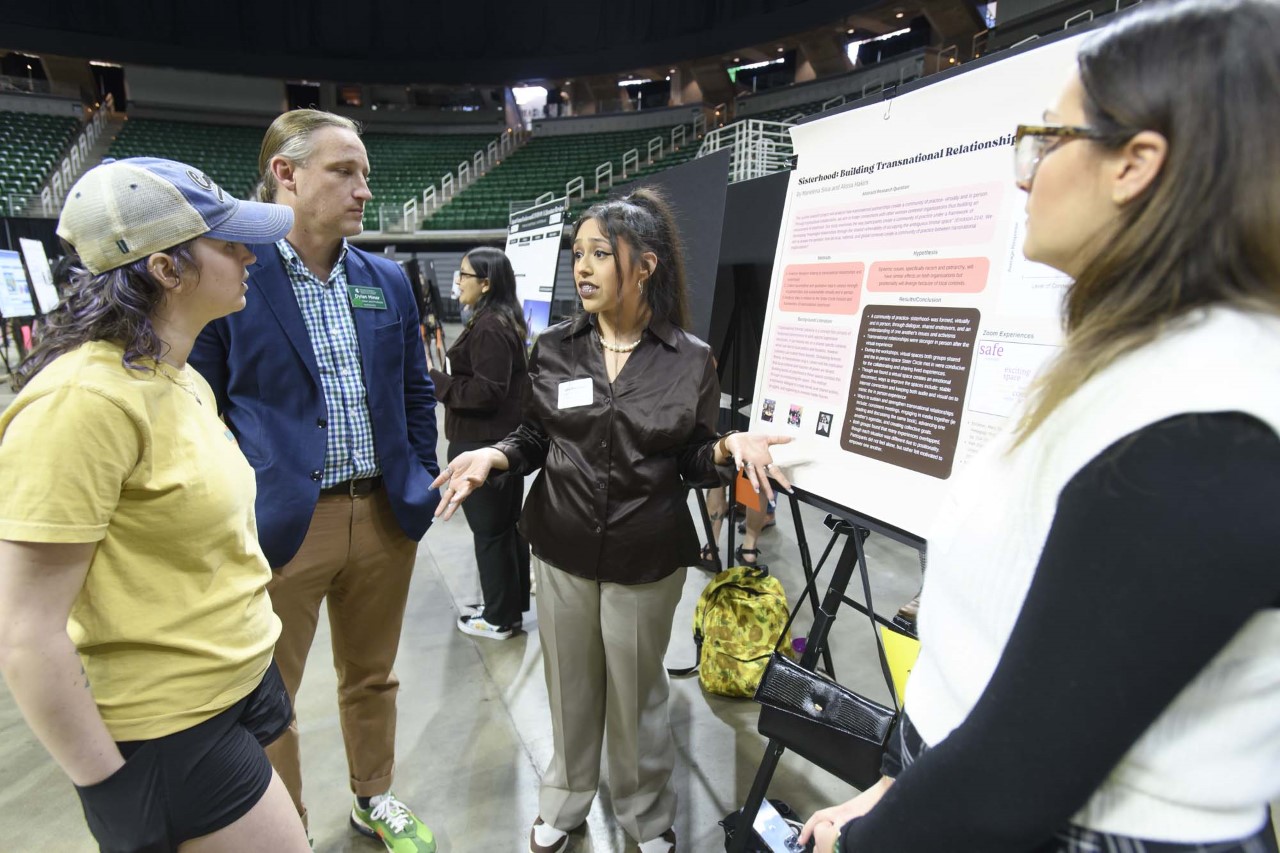Three Students Earn First-Place Honors at 25th Annual Undergrad Research Symposium
April 20, 2023
- “The projects undertaken by the College’s three first-place students—Alissa Hakim, Marielena Silva, and Maegan Jankowski—showcase the commitment of our students and faculty to community building, creative local and global partnerships, and collaboration across disciplines,” said RCAH Dean Dylan Miner.
- This is UURAF's 25th anniversary, with the awards ceremony being held Wednesday, April 26, at 4:30 p.m. in 1130 STEM Teaching and Learning Facility.
- Ten RCAH students presented this year, alongside over 900 undergraduate students.
By Chrystel Lopez 23'
The Residential College in the Arts and Humanities (RCAH) at Michigan State University is celebrating three RCAH students who have been awarded with the 2023 University Undergraduate Research and Arts Forum (UURAF) first-place grand prize.
 UURAF is held each spring, ringing in its 25th anniversary this year. The award offers MSU students a unique educational opportunity to gain experience presenting their scholarship and creative activity, answering questions from audience members and guests, and receiving constructive feedback from judges. More than 900 undergraduate students presented, both in-person and virtually.
UURAF is held each spring, ringing in its 25th anniversary this year. The award offers MSU students a unique educational opportunity to gain experience presenting their scholarship and creative activity, answering questions from audience members and guests, and receiving constructive feedback from judges. More than 900 undergraduate students presented, both in-person and virtually.
This year’s RCAH UURAF winners are Maegan Jankowski '23, Alissa Hakim '24, and Marielena Silva '23. Ten RCAH students presented in total.
“RCAH students presented innovative and well-researched scholarship at the 25th annual UURAF last week,” said RCAH Dean Dylan Miner. “The projects undertaken by the College’s three first-place students—Alissa Hakim, Marielena Silva, and Maegan Jankowski—showcase the commitment of our students and faculty to community building, creative local and global partnerships, and collaboration across disciplines.”
The awards ceremony is Wednesday, April 26, at 4:30 p.m. in 1130 STEM Teaching and Learning Facility. (East Entrance, door closest to Wells Hall).
For more about UURAF, visit http://www.urca.msu.edu/uuraf
RCAH Student Presentations
SKELETAL SEX ESTIMATION BASED ON APPLICATION OF DISCRIMINANT FUNCTION ANALYSIS OF MAYAN LONG BONE LENGTHS
Presenter(s): Maegan Jankowski
Anthropology & Archeology, Poster - in person
Presentation Section: 3, at 3:00 - 4:30 PM, Breslin Arena
Presentation Number: 221
Mentor(s): Gabriel Wrobel (Social Sci)
The aim for this study is to determine the sex estimation of Mayan skeletal remains based on the analysis of long bones. In order to achieve this, I first had to determine which of the Mayan skeletal remains would be usable for this project. Then, I estimated the sex of each individual by analyzing specfic features of the pelvic girdle. Afterwards, I took the measurement each of the long bones and their specific features, and estimated the sex of each individual based on how robust each of the features were. Lastly, I compared the sex estimation results of the pelvis to the results of the long bone estimation to see if the sex estimation methods matched.
SISTERHOOD: BUILDING TRANSNATIONAL RELATIONSHIPS
Presenter(s): Alissa Hakim, Marielena Silva
Diversity & Interdisciplinary Studies, Poster - in person
Presentation Section: 2, at 3:00 - 4:30 PM, Breslin Arena
Presentation Number: 1113
Mentor(s): Sitara Thobani (Arts and Humanities), Tama Hamilton Wray (Arts and Humanities)
The RCAH Sister Circle is an organization that aims for the holistic development of undergraduate women of color professionally, personally, and academically. The current research project will analyze how transnational partnerships create a community of practice- virtually and in person. To do so, we will cultivate a space conducive to a reciprocal exchange of knowledge that integrates culture and community in a transnational partnership with the Young Women's Leadership Program at the University of Botswana. Through transcultural collaboration, we aim to foster connections with other woman-centered organizations thus building an environment of sisterhood. The concept of sisterhood has been central to feminist philosophy and organizing. Sisterhood is a connection that is not rooted in identity or physical classifications, but rather by a common struggle built around shared lived experiences and multiple social relations (Zaytoun and Ezekiel 196). Sisterhood is a relationship and a process that brings individuals together to envision a better future; thus, it is categorized as a community of practice. Our study examines the way participants create a community of practice under a framework of developing "meaningful relationships through the shared vulnerability of occupying the ambiguous liminal space" (Erickson 214). For the current research, we aim to answer the question: how do local, national, and global contexts create a community of practice between transnational organizations? We hypothesize that systemic issues, specifically racism and patriarchy, will have similar effects on both organizations but positionality will diverge because of local contexts.
Related stories:
RCAH Students Presenting at 25th Annual University Undergraduate Research and Arts Forum (UURAF)
